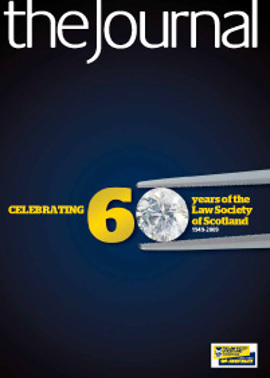At the heart of the debate

To paraphrase the Chinese, we live not only in interesting but challenging times.
As banks which have been at the very centre of Scotland’s financial structures effectively collapse and as unemployment rises, many may feel that stability no longer exists. In this respect the Law Society of Scotland, and Scotland’s lawyers generally, are coming increasingly to represent that stability which is so vital in any cohesive society.
The Society however is not some reactionary and archaic body. It has its own dynamic and the role it plays in shaping the legislation that goes through the Parliament is absolutely vital.
By and large there are few politicians with a legal background, and indeed one of the criticisms which has been validly made of the Scottish Parliament is that so many of its members come from the traditional roots of Scottish politicians, predominantly in the public sector. It is vital therefore that the politicians, especially the Justice Committee which I convene, can have impartial, measured and thoughtful advice given without fear or favour or political prejudice. Whilst the committee and the Parliament do not always accept the Society’s view, the representations which are made carry a very real authority and are never ignored.
I think that the Society’s opinion is valued not only because of the quality of its representatives who frequently give evidence to committee inquiries, but particularly as this evidence is given by people who will have to work with the law which the Parliament proposes to change. Advice from those who operate in
the front line is invaluable, and whilst the input of academics and those who hold strong and sincere views on a particular issue will always be greatly appreciated, those who will be responsible effectively for the practical application of what the Parliament might decide have a vital role to play.
One of the other features which is so valuable is the ability of the Law Society of Scotland and its representatives to take effectively a contrary view to that of the politicians. Again, the political view will prevail, but it is amazingly frequent that a Society opinion will concentrate the minds of politicians of all perspectives and modify that political view.
Of course the Society has contacts with politicians which are not on the basis of legislation or indeed committee inquiries, but in straightforward constituency matters. Again, when a complaint is made and submitted, members have confidence that the matter will be dealt with proportionately and sensibly.
In our present society and amidst the economic gloom it seems that all of life is full of changes, and nowhere is that more true than in the legal profession. The changes in governance of the profession have not come without their tensions and problems, and yet I am convinced that because of the input of the Society the eventual shape of the legislation which the Parliament will consider later this year will be in line with what the people of Scotland would wish. I think that the Society’s consideration of these matters was given with typical professionalism, and more importantly with unselfish detachment and a recognition that the status quo for the politicians was not an option. This straightforward approach to a major challenge has increased the respect in which the Society is held.
It is I know a matter for great disappointment that the public image of lawyers is sometimes damaged by the actions of a tiny minority. I have said many times that Scotland is well served by her lawyers, but the regulatory role which the Law Society of Scotland plays with regard to the conduct of its members is of significant public reassurance. That reassurance, by virtue of the fact that the Society has an indemnity fund and the appropriate insurances in place, protects clients who are on very few occasions prejudiced by either the fraudulent or negligent acts of practitioners. It is I know the envy of other jurisdictions that Scotland has so little difficulty with its lawyers and legal profession generally, and this is due in no small way to the discipline which the Society demands of its members and the system of checks and balances which is in place.
I offer my own congratulations on the occasion of this important anniversary and my heartfelt thanks, shared I am sure by the vast majority of politicians past and present, for the enormous contribution that the Law Society of Scotland makes, not only to the Scottish legal system but to Scottish public life.
In this issue
- Defining year
- At the heart of the debate
- In shape at 60
- Banks doing business
- To take us forward
- Striving after fairness
- Knowledge is protection
- The changing role of the law school
- Risk: nip it in the bud
- Close relations
- Conference keeps getting better
- Booming baby boomer
- Channel vision
- Variations on a theme
- Customer survey scores a plus
- Prepare for the upturn
- New look Society gets go-ahead
- Backing for "Wider Choice"
- Private client tax specialists recognised
- Law reform update
- From the Brussels office
- Target 2010
- Questions of our times
- Ask Ash
- Breaking the chain
- What will they do next?
- Sins of emission
- Scottish Solicitors' Discipline Tribunal
- Are we ready?
- Website review
- Book reviews
- Duty within bounds
- Change to fair
- Home reports update






